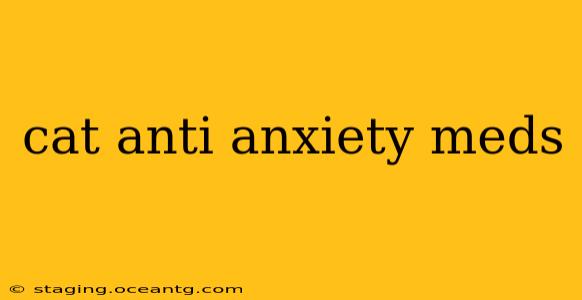Calming the Anxious Cat: Understanding and Managing Feline Anxiety
Feline anxiety is a significant concern for many cat owners. While a playful, relaxed cat is a joy, an anxious cat can suffer from a range of behavioral problems, impacting both their well-being and the harmony of your home. Understanding the causes and treatment options, including medication, is crucial for helping your furry friend. This article explores the world of anti-anxiety medication for cats, addressing common questions and concerns.
What are the signs of anxiety in cats?
Recognizing anxiety in cats can be challenging, as it manifests differently than in humans. Common signs include:
- Excessive vocalization: Meowing, yowling, or chattering excessively, often without apparent cause.
- Inappropriate elimination: Urinating or defecating outside the litter box.
- Destructive behavior: Scratching furniture, chewing on objects, or engaging in other destructive acts.
- Hiding: Spending excessive time hiding in secluded areas.
- Changes in appetite: Sudden loss or increase in appetite.
- Aggression: Increased aggression towards people or other pets.
- Restlessness: Pacing, excessive grooming, or constant vigilance.
- Changes in sleep patterns: Difficulty sleeping or excessive sleeping.
What medications are used to treat cat anxiety?
Several medications are commonly prescribed to manage cat anxiety, each with its own mechanism of action and potential side effects. These are generally only prescribed by a veterinarian after a thorough examination and discussion of the cat's overall health. It is crucial to never administer human medication to your cat without veterinary guidance. Some common classes of medications include:
- Benzodiazepines: These are short-term medications often used for acute anxiety, such as during travel or vet visits. They can be highly effective but have potential side effects like sedation and decreased coordination.
- Selective Serotonin Reuptake Inhibitors (SSRIs): These are long-term medications that work by affecting serotonin levels in the brain. They are often used for chronic anxiety and can have fewer sedative side effects than benzodiazepines, but they can take several weeks to take full effect.
- Tricyclic antidepressants (TCAs): These are another type of antidepressant that can be helpful for some cats, but they often have more side effects than SSRIs.
Are there natural remedies for cat anxiety?
While medication can be a vital tool, many owners explore natural remedies to complement or replace medication. These should always be discussed with a veterinarian to ensure safety and efficacy and should not replace prescribed medication unless advised by your vet. Some options include:
- Pheromone diffusers or sprays: These release synthetic versions of feline facial pheromones, which can have a calming effect on cats.
- Dietary changes: Certain diets formulated to support nervous system health may be helpful. Consult your vet.
- Environmental enrichment: Providing ample playtime, climbing opportunities, and hiding places can help reduce anxiety.
- Behavioral modification: Working with a certified cat behaviorist can help address underlying behavioral issues contributing to anxiety.
How long does it take for cat anxiety medication to work?
The time it takes for cat anxiety medication to work varies depending on the type of medication and your cat's individual response. Benzodiazepines can work quickly, within minutes to hours, but their effects are short-lived. SSRIs and TCAs typically take several weeks to reach their full effect.
What are the side effects of cat anxiety medication?
Side effects can vary widely depending on the medication and the individual cat. Some common side effects include:
- Sedation: Lethargy, sleepiness
- Changes in appetite: Increased or decreased appetite
- Gastrointestinal issues: Vomiting, diarrhea, constipation
- Increased thirst or urination
- Changes in behavior: Increased aggression or other behavioral changes
Can my cat become dependent on anxiety medication?
The potential for dependency varies depending on the type of medication and the duration of use. Benzodiazepines carry a higher risk of dependence than SSRIs or TCAs. It's vital to follow your veterinarian's instructions carefully and discuss any concerns about dependency.
When should I consult a vet about my cat's anxiety?
If you suspect your cat is suffering from anxiety, it’s essential to consult with your veterinarian. They can perform a thorough examination, rule out any underlying medical conditions, and recommend appropriate treatment options. Early intervention is key to managing cat anxiety and improving your cat's quality of life. Remember, only your vet can provide diagnosis and treatment plans. This information is for educational purposes only and should not be considered veterinary advice.
